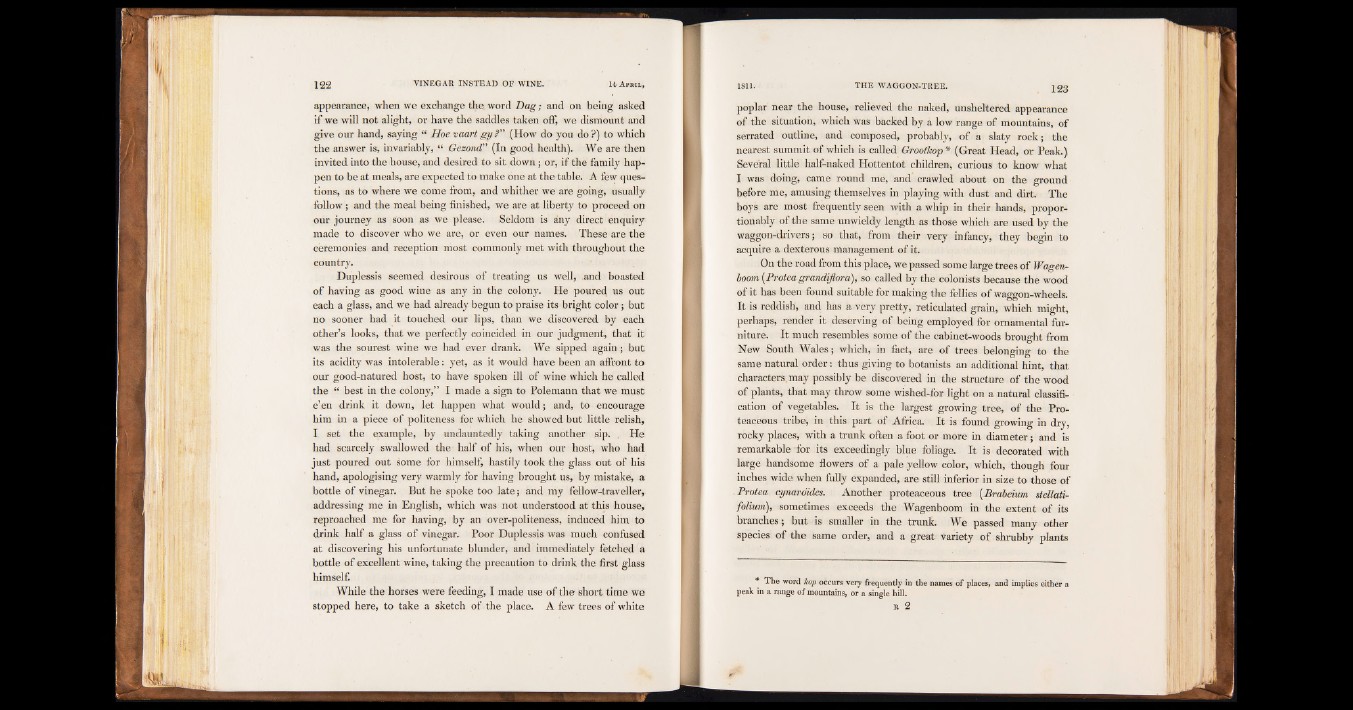
appearance, when we exchange the word Dag; and on being asked
if we will not alight, or have the saddles taken off, we dismount and
give our hand, saying “ Hoe vaart gy f ” (How do you do ?) to which
the answer is, invariably, “ Gezond” (In good health). We are then
invited into the house, and desired to sit down; or, if the family happen
to be at meals, are expected to make one at the table. A few questions,
as to where we come from, and whither we are going, usually
follow; and the meal being finished, we are at liberty to proceed on
our journey as soon as we please. Seldom is any direct enquiry
made to discover who we are, or even our names. These are the
ceremonies and reception most commonly met with throughout the
country,
Duplessis seemed desirous of treating us well, and boasted
of having as good wine as any in the colony. He poured us out
each a glass, and we had already begun to praise its bright color; but
no sooner had it touched our lips, than we discovered by each
other’s looks, that we perfectly coincided in our judgment, that it
was the sourest wine we had ever drank. We sipped again; but
its acidity was intolerable: yet, as it would have been an affront to
our good-natured host, to have spoken ill of wine which he called
the “ best in the colony,” I made a sign to Polemann that we must
e’en drink it down, let happen what would; and, to encourage
him in a piece of politeness for which he showed but little relish,
I set the example, by undauntedly taking another sip. . He
had scarcely swallowed the half of his, when our host, who had
just poured out some for himself, hastily took the glass out of his
hand, apologising very warmly for having brought us, by mistake, a
bottle of vinegar. But he spoke too late; and my fellow-traveller,
addressing me in English, which was not understood at this house,
reproached me for having, by an over-politeness, induced him to
drink half a glass of vinegar. Poor Duplessis was much confused
at discovering his unfortunate blunder, and immediately fetched a
bottle of excellent wine, taking the precaution to drink the first glass
himself.
While the horses were feeding, I made use of the short time we
stopped here, to take a sketch of the place. A few trees of white
poplar near the house, relieved the naked, unsheltered appearance
of the situation, which was backed by a low range of mountains, of
serrated outline, and composed, probably, of a slaty rock; the
nearest summit of which is called Grootlcop* (Great Head, or Peak.)
Several little half-naked Hottentot children, curious to know what
I was doing, came round me, and crawled about on the ground
before me, amusing themselves in playing with dust and dirt. The
boys are most frequently seen with a whip in their hands, propor-
tionably of the same unwieldy length as those which are used by the
waggon-drivers; so that, from their very infancy, they begin to
acquire a dexterous management of it.
On the road from this place, we passed some large trees of Wagen-
boorn (Protea grandiflora), so called by the colonists because the wood
of it has been found suitable for making the fellies of waggon-wheels.
It is reddish, and has a very pretty, reticulated grain, which might,
perhaps, render it deserving of being employed for ornamental furniture.
It much resembles some of the cabinet-woods brought from
New South Wales; which, in fact, are of trees belonging to the
same natural order: thus giving to botanists an additional hint, that
characters, may possibly be discovered in the structure of the wood
of plants, that may throw some wished-for light on a natural classification
of vegetables. It is the largest growing tree, of the Pro-
teaceous tribe, in this part of Africa. It is found growing in dry,
rocky places, with a trunk often a foot or more in diameter; and is
remarkable for its exceedingly blue foliage. It is decorated with
large handsome flowers of a pale yellow color, which, though four
inches wide when fully expanded, are still inferior in size to those of
Protea cynaroides. Another proteaceous tree (Brabeium stellati-
folium), sometimes exceeds the Wagenboom in the extent of its
branches; but is smaller in the trunk. We passed many other
species of the same order, and a great variety of shrubby plants
* The word kop occurs very frequently in the names of places, and implies either a
peak in a range of mountains, or a single hill.